Welcome to Mexico, a country ravaged by internal tensions, corrupt politicians, rural rebellions and threatened by the looming shadow of her northern neighbour. In Man the Guns, you will get the chance to work through all these obstacles, reform the nation and turn them into a power strong enough to expand or involve themselves in WW2.

The Good, The Bad and The Ugly
Mexico’s politics at this time were dominated by revolutionary generals who toppled the dictator Diaz and then squabbled amongst themselves, issuing their pronunciamiento (a justification for their attempt to seize power) and betraying one another ruthlessly. Three of the main figures from these caudillos (a word combining the role of warlord, patron, businessman and politician) were President Lázaro Cárdenas, President Plutarco Calles, and military strongman Saturnino Cedillo. The ruling clique gradually turned from coups and civil wars to less violent means of seeking power, but at the start of the game this transition is still taking place.

Lázaro Cárdenas, president from 1934 to 1940, was a socialist who led the nationalisation of Mexican oil concessions, built up state financing of manufacturing industries, encouraged the collectivisation of peasant farms and their protection from landlords via Ejido militias, and is celebrated today for his role in modernising the nation. Historically he helped the transition of Mexico from military dictatorship to a stable and functioning democracy thanks to his ability to both compromise with moderate opposition and undermine domestic threats to the state from extremists.

Plutarco Calles, president from 1924 to 1928 and “shadow president” for much of the reigns of his successors, was a divisive figure to say the least. He attempted to cement the state’s power over the Catholic Church in Mexico using brutal suppression of priests and their faithful, going as far as torturing and even crucifying dissidents. The Cristiada, a rebellion by rural farmers to oppose this forced secularisation, won little success in the field against Calles’ troops, hardened as they were by civil war and supported by modern artillery and bomber planes, but it did cause some concern inside the ruling clique over methods, ultimately leading to a compromise between church and state. Calles still clings to the power he has left, and you must either throw him out of the country or accept his role in the new Mexico.

Saturnino Cedillo, governor of San Luis Potosí, was one of the last of the caudillos to threaten the Mexican state. A survivor, he absorbed remnants of the Cristero rebels into his private army and managed to maintain relative independence in his province which the central government sought to crush. Ultimately he rebelled against Cardenas’ incursions into his power base. Historically his rebellion was short lived as the Cardenas government successfully undercut his support and disarmed his paramilitary forces, killing him in the field within a few months. Cardenas suspected America and Britain of inciting Cedillo’s rebellion by promising support, in order to punish Mexico for seizing their oil concessions, but no such support ever arrived.
Economic Development

Mexico is a major producer of oil at the game start and only stands to increase its role as an exporter as the conflagration grips the world and upsets the flow of trade around the globe. Historically Mexico’s nationalisation of the concessions granted by Cardenas’ predecessors (mostly to Royal Dutch Shell and Standard Oil of California) caused a backlash from Britain and America which served to isolate Mexico and almost pushed them into the arms of the Germans. In game, you must develop your oil if you wish to become a major international player, and on the way you will build up your infrastructure using either Cardenas’ path of socialism and import substitution, or his successor Avila’s preference, liberalisation and privatisation.

As seen in the Dutch dev diary, HoI4 is getting a new mechanic relating to concessions of resources from one country to another, which transfers the contents of a state free of charge. This will make its appearance in Mexico in the form of oil concessions to Royal Dutch Shell and Standard Oil of California. Nationalising these assets was a goal of the Mexican revolutionaries from the outset, and became a source of friction between Mexico and the former owners (Britain and America respectively) once President Cardenas actually took steps towards nationalisation.

Military Expansion

Mexico begins in 1936 as a war-weary third rate power, wracked by internal tensions and the legacy of decades of civil war. This was not always the case, however. The armaments industry established by President Diaz prior to the instability was making many advances in weapons technology, aircraft production, and even experiments in tank development. The famous Mondragon rifle was one of the earliest pioneers in semi-automatic small arms. A more assertive Mexico would also likely reject reliance on Italian gunboats and American hand-me-down destroyers if she sought to contest the oceans.


After building up factories and shipyards, you have a choice to make on both the army and naval branches of the tree.
A Mexico uninterested in fighting decisive battles might instead decide to focus on convoy raiding, whereas choosing the contest the surface against your rivals will require a powerful surface fleet. The two “finishers” on the naval tree reflect these differences.

When it came to land battles during the various insurrections against the central government, Mexico utilised her infantry, cavalry and nascent airforce in a powerful combined arms force the rebels were unable to defeat, and you will likewise be able to modernise the different branches of the armed forces until deciding between conventional artillery or aerial support as the “finisher” on the army side of the tree.
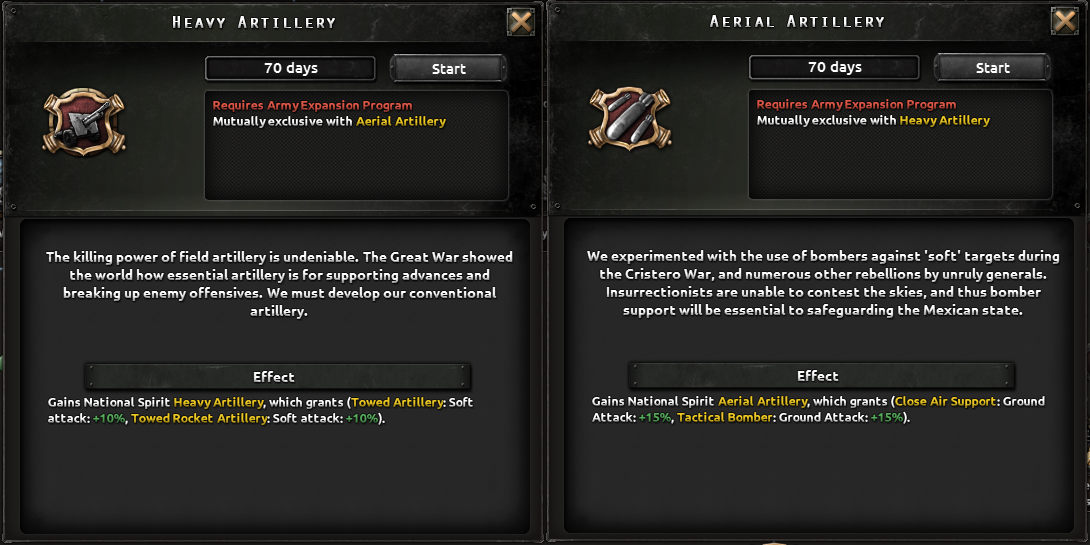
Diplomatic Relations

Mexico is considered America’s “backyard”, an insulting and imperious attitude for the Yanquis to take but one the Mexican leadership must consider seriously before making their move. Taking independent action on the international stage, aligning towards one of America’s enemies, or threatening America’s economic interests would all be causes of concern for President Roosevelt, let alone his more expansionist domestic rivals. Mexico can gamble on her northern neighbour being too isolationist to intervene south, but if the gamble doesn’t pay off, there’ll be Hell to pay.

Religion
The biggest divide in Mexican society at the time was certainly the place of the Church within society. Most of the Mexican ruling class was strongly anticlerical and a law “on the tolerance of sects” meant that the priests heavily controlled by the state. If you want to change the situation, it will be up to you to progressively support the Catholic Church by giving back their lands and amend the anticlerical laws. If you go down that path the destruction of the separation between the Church and the State will be waiting for you at the end of the road.
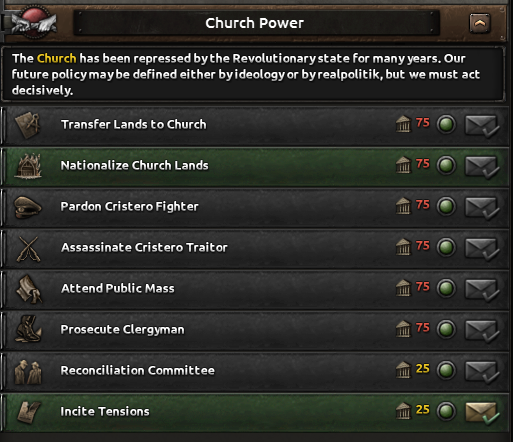
Two groups can rise to power hand in hand with the Church: the Catholic conservatives and the Synarchists. The conservatives try to combine their religious beliefs with republican institutions. It would lead to the rise of the Party of National Action of Manuel Gómez Morín. As an alternative, the restoration of the Church can be concomitant with a much more radical group: the Synarchists. That group will try to institute a “clerical-fascist” state, using the influence of the members of the Church eager to seek their revenge on the anticlericalists who ruled Mexico since the 1911 revolution. At the end of both trees, you can contact the veterans of the Cristero War and incorporate them to your armed forces. Such course of action will obviously anger the former ruling class that will surely try to contest power in order to reestablish the anticlerical legal system.
Revolutionary Legacy
At the start of the game, the Mexican army is divided politically as various generals support their own political group depending on their political orientation (they were usually opposed to the Church). One of your first choice will therefore concern the fate of the armed forces. You can choose to control and depoliticize them, transforming them into a professional force or embrace one of those groups and use them to quickly shift the political landscape of the country.
If you choose to support the Gold Shirts, the country will evolve into an anticlerical authoritarian regime. The exact nature of that regime can however vary a bit. Supporting Plutarco Calles (by selecting the “Jefe Maximo” focus) will grant direct control over the state as he was unable to fully control Cardenas. If Calles was previously exiled and the general Saturnino Cedillo was supported however, he will lead the opposition and take control of the government. If none of those conditions are fulfilled, Nicolás Rodríguez Carrasco, the leader of the Gold Shirts will lead the country instead.
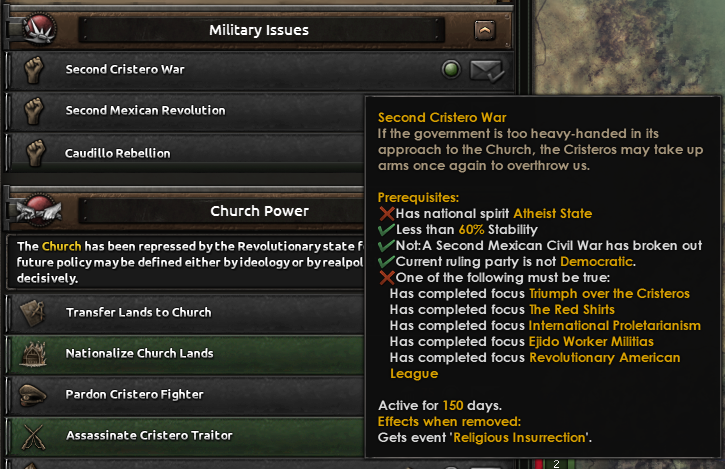
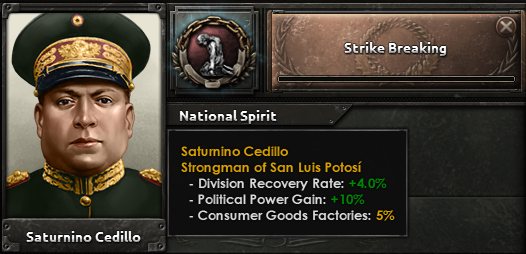
As an alternative to right-wing authoritarianism, you can favor the communist Red Shirts and suppress other political movements instead. This revolutionary movement will give the presidential seat to the Trotskyist head of the communist party Hernán Laborde

… unless you invited his mentor to the government previously.

You would then be rewarded by Leon himself, awake and angry, ready to take his revenge against Stalin

It would then be your objective to lead the 4th Internationale and show how superior it is to the 3rd (aka the Comintern).
If you want more peaceful solutions, multiple tools are at your disposal, depending on your political orientation. If you are communist and don’t want to embrace the political legacy of the 4th International, you can try to form the Revolutionary American League and spread communism in Latin American countries.
As a more right wing oriented government, you can support “Hispanism”; the concept that the countries of South America should support each other; and try to form a faction including all of South America. If you are fascist (Synarchist or anticlerical), the effect will change from a diplomatic offensive to a more violent one. This course of action will allow you access to wargoal focuses that could enable you to unite South America by force.
If trying to dramatically change the political order in Latin America is not your thing, you can simply adopt “Realpolitik” and find allies in order to survive this era of global conflict.
Territorial Expansion
If you don’t want to just send a few planes to help the US against the Japanese, several expansion paths will be available to you once your diplomatic status is settled. Most of those will grant you wargoals against neighboring countries and in some cases, the addition of new cores will become possible.

The most peculiar plan is certainly “Operation Just Cause”. If you approve that plan you will be in a border conflict against US in order take control of the Panama canal area.
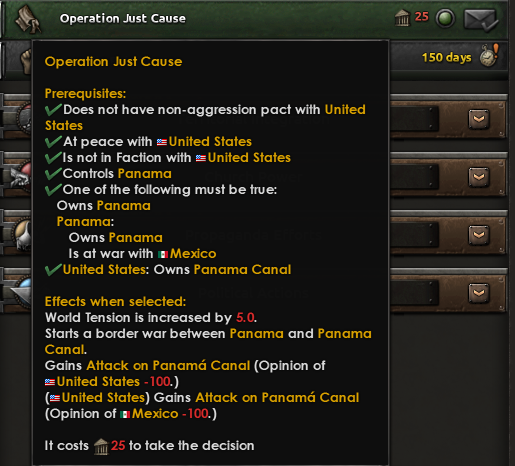
This will of course anger the US so be careful. The rest is either pretty straightforward or will be food for thoughts until the release.
Mexico was our final focus tree for MTG, so next we return to to the seas for more naval gameplay updates.
READ Thread mark before posting (no offtopic spam)

The Good, The Bad and The Ugly
Mexico’s politics at this time were dominated by revolutionary generals who toppled the dictator Diaz and then squabbled amongst themselves, issuing their pronunciamiento (a justification for their attempt to seize power) and betraying one another ruthlessly. Three of the main figures from these caudillos (a word combining the role of warlord, patron, businessman and politician) were President Lázaro Cárdenas, President Plutarco Calles, and military strongman Saturnino Cedillo. The ruling clique gradually turned from coups and civil wars to less violent means of seeking power, but at the start of the game this transition is still taking place.

Lázaro Cárdenas, president from 1934 to 1940, was a socialist who led the nationalisation of Mexican oil concessions, built up state financing of manufacturing industries, encouraged the collectivisation of peasant farms and their protection from landlords via Ejido militias, and is celebrated today for his role in modernising the nation. Historically he helped the transition of Mexico from military dictatorship to a stable and functioning democracy thanks to his ability to both compromise with moderate opposition and undermine domestic threats to the state from extremists.

Plutarco Calles, president from 1924 to 1928 and “shadow president” for much of the reigns of his successors, was a divisive figure to say the least. He attempted to cement the state’s power over the Catholic Church in Mexico using brutal suppression of priests and their faithful, going as far as torturing and even crucifying dissidents. The Cristiada, a rebellion by rural farmers to oppose this forced secularisation, won little success in the field against Calles’ troops, hardened as they were by civil war and supported by modern artillery and bomber planes, but it did cause some concern inside the ruling clique over methods, ultimately leading to a compromise between church and state. Calles still clings to the power he has left, and you must either throw him out of the country or accept his role in the new Mexico.

Saturnino Cedillo, governor of San Luis Potosí, was one of the last of the caudillos to threaten the Mexican state. A survivor, he absorbed remnants of the Cristero rebels into his private army and managed to maintain relative independence in his province which the central government sought to crush. Ultimately he rebelled against Cardenas’ incursions into his power base. Historically his rebellion was short lived as the Cardenas government successfully undercut his support and disarmed his paramilitary forces, killing him in the field within a few months. Cardenas suspected America and Britain of inciting Cedillo’s rebellion by promising support, in order to punish Mexico for seizing their oil concessions, but no such support ever arrived.
Economic Development

Mexico is a major producer of oil at the game start and only stands to increase its role as an exporter as the conflagration grips the world and upsets the flow of trade around the globe. Historically Mexico’s nationalisation of the concessions granted by Cardenas’ predecessors (mostly to Royal Dutch Shell and Standard Oil of California) caused a backlash from Britain and America which served to isolate Mexico and almost pushed them into the arms of the Germans. In game, you must develop your oil if you wish to become a major international player, and on the way you will build up your infrastructure using either Cardenas’ path of socialism and import substitution, or his successor Avila’s preference, liberalisation and privatisation.

As seen in the Dutch dev diary, HoI4 is getting a new mechanic relating to concessions of resources from one country to another, which transfers the contents of a state free of charge. This will make its appearance in Mexico in the form of oil concessions to Royal Dutch Shell and Standard Oil of California. Nationalising these assets was a goal of the Mexican revolutionaries from the outset, and became a source of friction between Mexico and the former owners (Britain and America respectively) once President Cardenas actually took steps towards nationalisation.

Military Expansion

Mexico begins in 1936 as a war-weary third rate power, wracked by internal tensions and the legacy of decades of civil war. This was not always the case, however. The armaments industry established by President Diaz prior to the instability was making many advances in weapons technology, aircraft production, and even experiments in tank development. The famous Mondragon rifle was one of the earliest pioneers in semi-automatic small arms. A more assertive Mexico would also likely reject reliance on Italian gunboats and American hand-me-down destroyers if she sought to contest the oceans.


After building up factories and shipyards, you have a choice to make on both the army and naval branches of the tree.
A Mexico uninterested in fighting decisive battles might instead decide to focus on convoy raiding, whereas choosing the contest the surface against your rivals will require a powerful surface fleet. The two “finishers” on the naval tree reflect these differences.

When it came to land battles during the various insurrections against the central government, Mexico utilised her infantry, cavalry and nascent airforce in a powerful combined arms force the rebels were unable to defeat, and you will likewise be able to modernise the different branches of the armed forces until deciding between conventional artillery or aerial support as the “finisher” on the army side of the tree.

Diplomatic Relations

Mexico is considered America’s “backyard”, an insulting and imperious attitude for the Yanquis to take but one the Mexican leadership must consider seriously before making their move. Taking independent action on the international stage, aligning towards one of America’s enemies, or threatening America’s economic interests would all be causes of concern for President Roosevelt, let alone his more expansionist domestic rivals. Mexico can gamble on her northern neighbour being too isolationist to intervene south, but if the gamble doesn’t pay off, there’ll be Hell to pay.

Religion
The biggest divide in Mexican society at the time was certainly the place of the Church within society. Most of the Mexican ruling class was strongly anticlerical and a law “on the tolerance of sects” meant that the priests heavily controlled by the state. If you want to change the situation, it will be up to you to progressively support the Catholic Church by giving back their lands and amend the anticlerical laws. If you go down that path the destruction of the separation between the Church and the State will be waiting for you at the end of the road.

Two groups can rise to power hand in hand with the Church: the Catholic conservatives and the Synarchists. The conservatives try to combine their religious beliefs with republican institutions. It would lead to the rise of the Party of National Action of Manuel Gómez Morín. As an alternative, the restoration of the Church can be concomitant with a much more radical group: the Synarchists. That group will try to institute a “clerical-fascist” state, using the influence of the members of the Church eager to seek their revenge on the anticlericalists who ruled Mexico since the 1911 revolution. At the end of both trees, you can contact the veterans of the Cristero War and incorporate them to your armed forces. Such course of action will obviously anger the former ruling class that will surely try to contest power in order to reestablish the anticlerical legal system.
Revolutionary Legacy
At the start of the game, the Mexican army is divided politically as various generals support their own political group depending on their political orientation (they were usually opposed to the Church). One of your first choice will therefore concern the fate of the armed forces. You can choose to control and depoliticize them, transforming them into a professional force or embrace one of those groups and use them to quickly shift the political landscape of the country.
If you choose to support the Gold Shirts, the country will evolve into an anticlerical authoritarian regime. The exact nature of that regime can however vary a bit. Supporting Plutarco Calles (by selecting the “Jefe Maximo” focus) will grant direct control over the state as he was unable to fully control Cardenas. If Calles was previously exiled and the general Saturnino Cedillo was supported however, he will lead the opposition and take control of the government. If none of those conditions are fulfilled, Nicolás Rodríguez Carrasco, the leader of the Gold Shirts will lead the country instead.


As an alternative to right-wing authoritarianism, you can favor the communist Red Shirts and suppress other political movements instead. This revolutionary movement will give the presidential seat to the Trotskyist head of the communist party Hernán Laborde

… unless you invited his mentor to the government previously.

You would then be rewarded by Leon himself, awake and angry, ready to take his revenge against Stalin

It would then be your objective to lead the 4th Internationale and show how superior it is to the 3rd (aka the Comintern).
If you want more peaceful solutions, multiple tools are at your disposal, depending on your political orientation. If you are communist and don’t want to embrace the political legacy of the 4th International, you can try to form the Revolutionary American League and spread communism in Latin American countries.
As a more right wing oriented government, you can support “Hispanism”; the concept that the countries of South America should support each other; and try to form a faction including all of South America. If you are fascist (Synarchist or anticlerical), the effect will change from a diplomatic offensive to a more violent one. This course of action will allow you access to wargoal focuses that could enable you to unite South America by force.
If trying to dramatically change the political order in Latin America is not your thing, you can simply adopt “Realpolitik” and find allies in order to survive this era of global conflict.
Territorial Expansion
If you don’t want to just send a few planes to help the US against the Japanese, several expansion paths will be available to you once your diplomatic status is settled. Most of those will grant you wargoals against neighboring countries and in some cases, the addition of new cores will become possible.

The most peculiar plan is certainly “Operation Just Cause”. If you approve that plan you will be in a border conflict against US in order take control of the Panama canal area.

This will of course anger the US so be careful. The rest is either pretty straightforward or will be food for thoughts until the release.
Mexico was our final focus tree for MTG, so next we return to to the seas for more naval gameplay updates.
Rejected Titles:
- Mexico? More like Maxico!
- Making your casa my casa
- Where in the world is Leon Trotsky?
- No one expects the Mexican inquisition. Seriously. No one...
- Mexico, or how I learned to stop worrying and love el jefe
- Hit or Miss, I Guess They Never Miss Huh, You Got a Trotsky, Stalin gon' Icepick Ya
READ Thread mark before posting (no offtopic spam)



